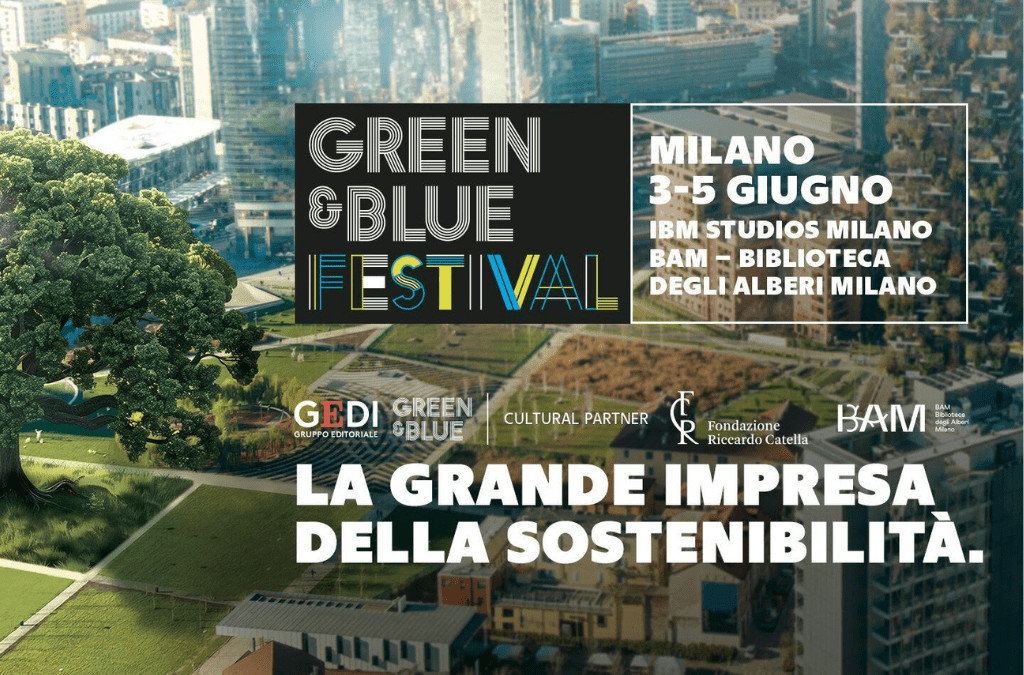The event
Held in Milan from June 3 to 5, the new edition of the Green & Blue Festival: a three-day event of conferences, debates and workshops on the themes of sustainability and the environment, promoted by La Repubblica in the spaces of IBM Studios Milan and Biblioteca degli Alberi park.
The National Green Cities 2024 Conference “Toward Nature Positive Cities” opened the proceedings, in which we at Green Growth Generation also participated.. What is and what should be the role of cities in the path toward the ecological transition of our country?
“Promoting the restoration of nature and biodiversity within the urban ecosystem will be a central element in our societies’ journey toward climate neutrality,” explained Foundation for Sustainable Development President Edo Ronchi, in introducing the Charter for Nature-Positive Cities, a compass toward the green transition for all public administrations.
Ten points, ten steps for implementing an action plan for the ‘nature-positive’ transition of our cities. First and foremost, essential is to have both greater sharing and more widespread knowledge and Better information on the value of natural capital and ecosystem services for climate crisis mitigation and adaptation, air depollution, and improving the quality and livability of the urban environment.
According to the most recent ISTAT data, climate change is the main source of concern for Italians. “This fear must turn into a push to cooperate together and get out of this crisis,” Ronchi concluded.

The interventions
During the festival, numerous experts and speakers shared their experiences and visions on how cities can and must transform to address the climate crisis and promote sustainable development.
The director of the Department of Planning, Design, and Architectural Technology at La Sapienza University in Rome., Fabrizio Tucci, recounted concrete cases of eco-neighborhoods, emphasizing the importance of regeneration and circularity. “Examples such as the Andromède Ecodistrict in Toulouse, and the Essen district in Germany, highlight how it is possible to integrate sustainability into urban architecture, and demonstrate that ecological transformation is not only possible but also beneficial.”

Caterina Sarfatti presented the work of C40 Cities, a global network of the world’s major metropolises committed to the fight against climate change: “the climate crisis is a story of inequality… since 1990, 0.01 percent of the population has increased its per capita emissions by 80 percent.” Sarfatti also spoke about the mayor of Free Town, Sierra Leone, who leads the C40 and has made reforestation a key focus for the city’s development in an area of high hydrogeological risk.
During the talk, there was also room for some speeches from the public administration. Irene Priolo, vice president of the Emilia Romagna region, emphasized how the ecological transition is directing the productive sector:
“The business system is often ahead of public policy on sustainability issues…regions need to have a more competitive legislative system on environmental issues, but these are currently the exclusive responsibility of the state.”
Words that echoed those of the mayor of Bologna, Matteo Lepore, who went on to describe the concept of “City 30” – for which the mayor himself recently made headlines-as a political battle to redesign public transportation service and create a more livable and sustainable city.
Closing the proceedings was a talk by botanist and essayist Stefano Mancuso, with a reflection on the history of cities and our relationship with nature. “In 1970, only 30 percent of the population lived in cities, while Today 70-80% of the population is urbanized. A remarkable change of pace, which has led to radical mutations in our behaviors and habits.”
But natural laws are universal and cannot be ignored: “For 288,000 years we were in balance with nature … until the advent of the agricultural revolution, which marked the beginning of our settled life and the creation of cities.” A call to rethink cities in harmony with nature, and to remember that scientific truth must be recognized and not treated as an opinion.

by
Alessandro Bertozzi

